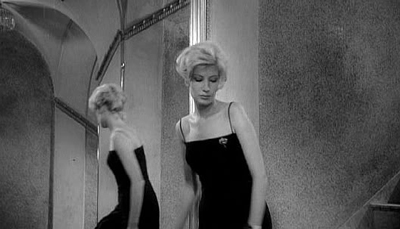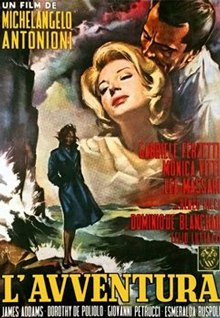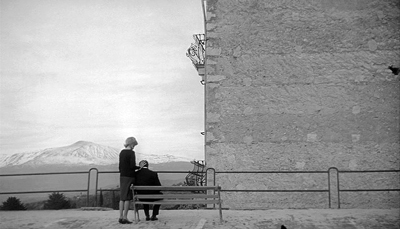
 |
|
|
|
The justly honored L'avventura has only become better with age. Michelangelo Antonioni's stunning drama is not an artistic exercise, but a film that goes beyond storytelling to express personal states of mind and the mysteries of interpersonal dynamics. What is that that seems to make the well-heeled Italians of 1960 so restless and discontented? They've avoided the hardship and poverty that most of the country can still feel, so why are they so personally unfulfilled? The show was a major influence on progressive filmmakers everywhere, encouraging them to see the possibilities of narratives freed from literary structures, and the need for dialogue to carry every plot point. Everybody talks in L'avventura but the real story is in their eyes, their behaviors and their emotional reactions. It's less a filmed script than a life-flow. 
Claudia (Monica Vitti) is invited on a posh cruise by her friend Anna (Lea Massari), who is unhappy with her boyfriend Sandro (Gabrielle Ferzetti, of Once Upon a Time in the West). They've been together three years but she's grown doubtful about their future. When they're separated he's a marvelous fantasy, but when they're together, "What you see is all you get." While spending a casual afternoon on a rocky island, Anna simply disappears, cueing a fruitless search. She and Sandro had quarreled but suicide seems wholly unlikely. The rest of the wealthy boat guests get back to visiting one another in villas or on the hotel circuit, while Sandro and Claudia try to locate Anna on the mainland - and fall into a complicated, guilty love affair of their own. Michelangelo Antonioni (La Notte, Red Desert) is an easy target for film reactionaries. When naysayers dismiss European art films as existential navel-gazing, about people standing around doing nothing, the name Antonioni is often on the top of the list. As it turns out, L'avventura is an engrossing picture that pulls us deeper into its (human) mystery with every scene. Lea Massari and Monica Vitti are vibrantly alive as young woman struggling with love in the modern age. The emotionally needy Anna expects her Sandro to express his love for her at all times. If he seems inattentive she becomes depressed or hostile. When Claudia falls in love with Sandro, she's caught between guilt and her own desires. The film has two or three marvelous scenes in which Claudia revels in the pleasure and happiness of being in love. But the doubts get to her as well. If relationships are so easily made and broken, none can be expected to last. Are people no longer able to commit to other people amid the freedom afforded by wealth? Does anything have value any more? 
Character observation is everything in L'avventura. Claudia comes from a much more modest background than her girlfriend, yet is not a hanger-on like some of the family friends. Anna's industrialist father tries to advise her, but she rejects him. The spoiled ladies on the yacht holiday complain about their husbands and prefer the company of pet dogs, or in the case of the indolent Giulia (Dominique Blanchar), a very young 'artist' that can be counted on to provide affection on demand. Although concerned for Anna, most of the holiday-makers soon turn their attention back to their own desires, especially when one theory supposes that Anna might have hitched a ride on an outgoing boat without telling anyone. Except for her father, Claudia and Sandro, in a few hours Anna has become an inconvenience. In two days she's made the subject of jokes. The rich seem rather hollow behind their good manners and calm behavior. Is Claudia too upset to out on the town dining with the group? She's left behind without so much as a concerned farewell. But t movie is not a class-conscious critique. Not being rich is no guarantee of sincerity. Claudia and Sandro encounter a number of working people who may have seen Anna, and their problems are much the same as the elites. A married couple is just as discontented and untrusting of one another. A reporter holds out for money before he'll aid Sandro in his search. As for the 'unwashed masses', Claudia gets a taste of their attitude when a group of unemployed village men gawk at her and crowd her menacingly in a public square.
The screenplay by Antonioni, Elio Bartolini and Tonino Guerra also constructs an impressively credible character for Sandro, a highly paid consulting architect as protective of The Good Life as any of his old-money friends. He's simply not monogamously inclined. He loves women but is not willing to really dedicate himself to one. The moment Claudia is too tired to go accompany him to a bar, he once again becomes the handsome guy on the prowl. Other scenes reveal Sandro's very real frustrations - he envies his creative associates but is unwilling to abandon his soft niche as a specialist in building estimates. He's so bitter about this that he maliciously bullies a younger architect-hopeful. This is a side
This is a story where 'nothing happens' -- no chases, no crucial plot developments, no pat solution to the mystery. But few movies use visuals so intensely. The characters are isolated and exposed on the rocky island; Anna could be dead a few feet away and nobody would know. Claudia explores the fancy villas and (with Sandro) various towns as if they were part of an alien civilization. Antonioni never settles for political messages or easy attacks on materialism. To Antonioni all of life is a mystery. At one point Anna gives Claudia one of her dresses, as a gift. When they face away from us without their blouses on, they look identical except for the color of their hair. A day later Claudia has already taken Anna's place with Sandro. Are people as interchangeable as this? In some ways L'avventura is a standard thriller. Like both Psycho and The Seventh Victim, it involves a missing woman who is not recovered. The petulant Anna is here one moment, and gone the next; her disappearance is both unexplainable, and infinitely explainable. While watching we look for clues. One of the yacht guests could perhaps be a conscience-free killer - but probably not. Various leads go nowhere - the hermit on the island, the boatmen taht may be hiding something more than their smuggling. A boat is seen cruising in the distance, about the time Anna is noticed missing. Perhaps she just took off out of spite, and is staying with other friends elsewhere. Our instinct for movie thrillers keeps alive the notion that Anna is jealously stalking her searchers as they check from town to town. 
Antonioni's film is by no means impenetrable. There is no mystery in Patrizia's (Esmeralda Ruspoli) heartless handling of her gigolo. We feel sorry for the neglected Giulia (Dominique Blanchar) until we see her wanton selfishness, using Claudia as an audience for her surrender to the young artist. One standout scene borders on obviousness. Sandro follows a reporter covering a starlet's publicity stunt. The woman is the exact opposite of 'missing', as she throws herself into a fake situation calculated to attract a crowd of men. Her cheap trick of tearing her dress is like the lie Anna told about the shark: Anna wanted Sandro to be more demonstrative in his need for her. The crowd of photographers and gawkers aligns with the surly would-be rapists that unnerved Claudia back in the small-town square. For the starlet-Anna comparison to be complete, Anna's disappearance would have to be a deliberate act. Viewers familiar with the films of Val Lewton may ask if Antonioni's could have been inspired by a single scene in The Seventh Victim, a 1940s American film packed with morbid content that flew under the Production Code. An emotionally unbalanced woman has disappeared, and while searching, her husband and younger sister fall in love. A three-minute concluding scene between the lovers isn't even very well acted, but it sketches the central situation of L'avventura in just a couple of lines of dialogue. The sister and husband embrace but she feels too guilty to face him. She admits her terrible secret wish that her missing sister would be found dead, thus clearing the way for their romance. Meanwhile, the sister has lost all sense of belonging to anyone, and is ready to kill herself. Claudia feels the same hesitancy and pain over her 'fling', which is apparently a second definition of 'Avventura'. The 'ghost' of Anna is always there to remind them of their unfaithfulness, the knowledge of which prevents them from establishing faith in their future together. There is no emotional dialogue in L'avventura of the lovers lamenting the fact that they're searching for the one woman who can spoil their new happiness. It's as if they've lost belief in such things, as if sophistication has killed their ability to stand behind their own emotions. L'avventura elevated the Cult of Celebrity around successful film directors. This is when Federico Fellini began to turn inward and focus on his personal, interior problems and fantasies. Alfred Hitchcock reacted to the praise from Europe by taking himself more seriously. He made his own mysterious, inward-directed 'art' horror film, The Birds. The vocation of 'film director' suddenly replaced movie star in the public's daydream ambitions. 
A master of using film space, Antonioni's compositions are carefully worked out to enforce feelings of isolation for the individual, whether on an island, surrounded by traditional architecture or regarding an empty prefab town. When Claudia exults in happiness over Sandro, the ecstasy is contained within her, merely enjoyed by Sandro instead of being shared. Yes, the movie does end with the characters locked in a stasis-composition, he in tears, she compassionate to the man who has wronged her, before a background frequently interpreted as half ancient building, half a representation of the coldness between the characters, blah blah. Yet if one just watches in a receptive frame of mind this general conflict is communicated nonverbally. The Criterion Collection's Blu-ray of L'avventura is a beautiful rendering of the original's moods and textures, on the island, in the rain and sun, in fancy hotels and expensive villas. Monica Vitti and Gabrielle Ferzetti are a fascinating, handsome couple, and the their lovemaking scenes are like islands of joy in a long, troubled search. Giovanni Fusco's jazzy title music launches the picture on a modern note. A new extra is a three-part, fairly deepdish film analysis by the articulate Olivier Assayas. In an audio extra, Jack Nicholson recites writings by Antonioni and offers his own memories of the director. Returning from the old 2001 DVD is a lengthy 1966 documentary on Antonioni and an academic feature commentary by Gene Youngblood. Text extras in the insert booklet include an essay by Geoffrey Nowell-Smith, and Antonioni's own statements on the film. Also repeated from the DVD is a shameless American trailer from 1961 that uses every moment of exploitable activity to make the movie look like a sexy romp. Created by Lucien S. Y. Yang, the featured still artwork for this new disc features images of Vitti turned away from the camera, an expressive and appropriate design choice.
On a scale of Excellent, Good, Fair, and Poor,
L'avventura Blu-ray

The version of this review on the Savant main site has additional images, footnotes and credits information, and may be updated and annotated with reader input and graphics.
Review Staff | About DVD Talk | Newsletter Subscribe | Join DVD Talk Forum |
| ||||||||||||||||||